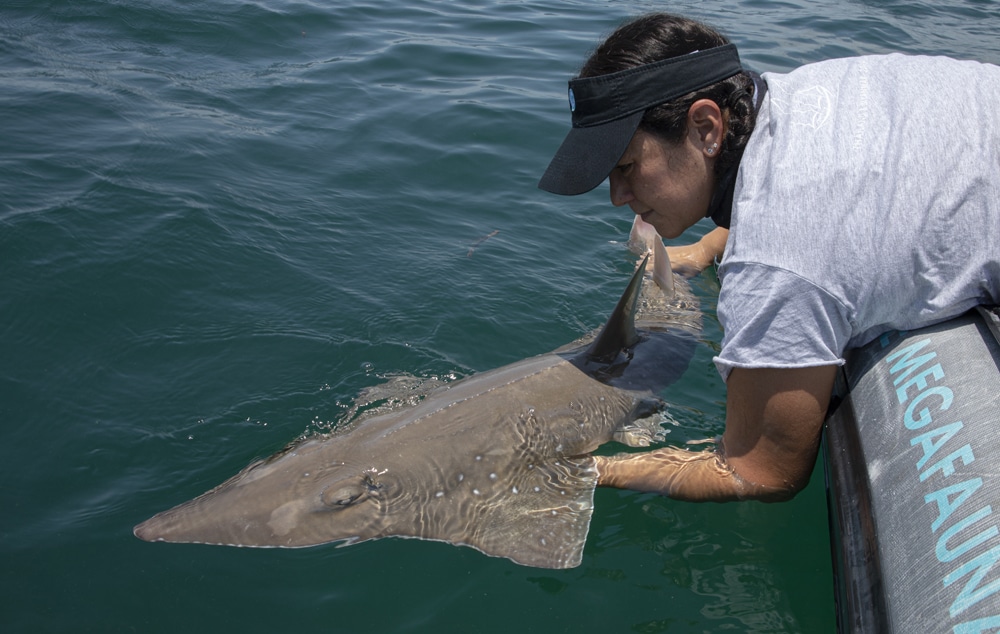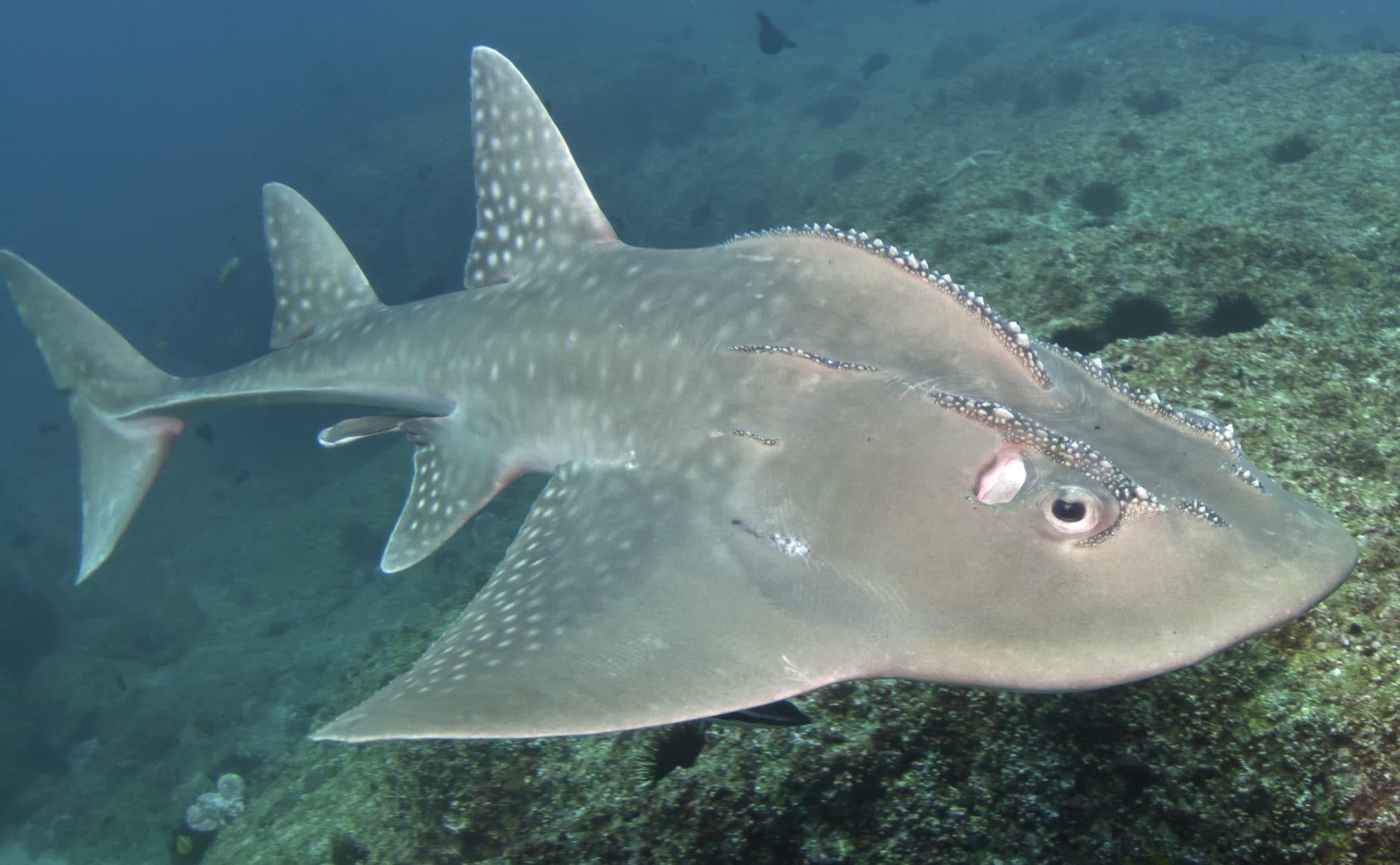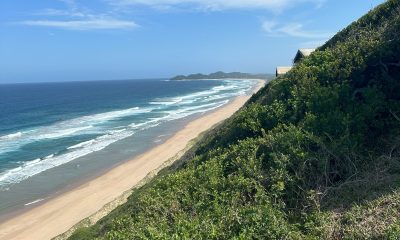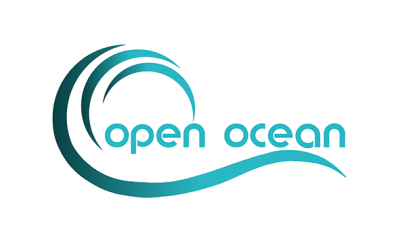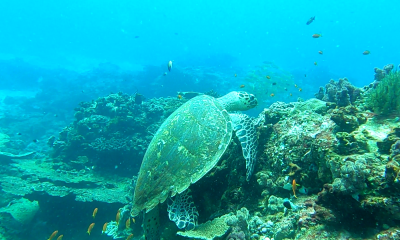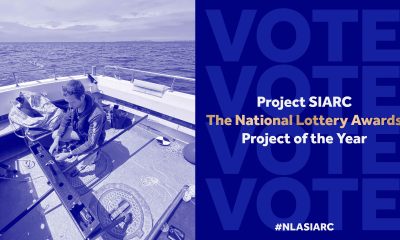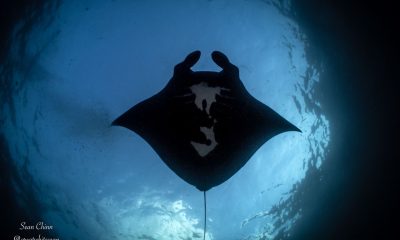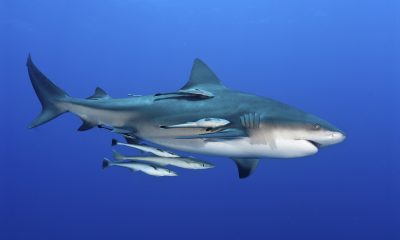Marine Life & Conservation
First of its kind Wedgefish tagging study
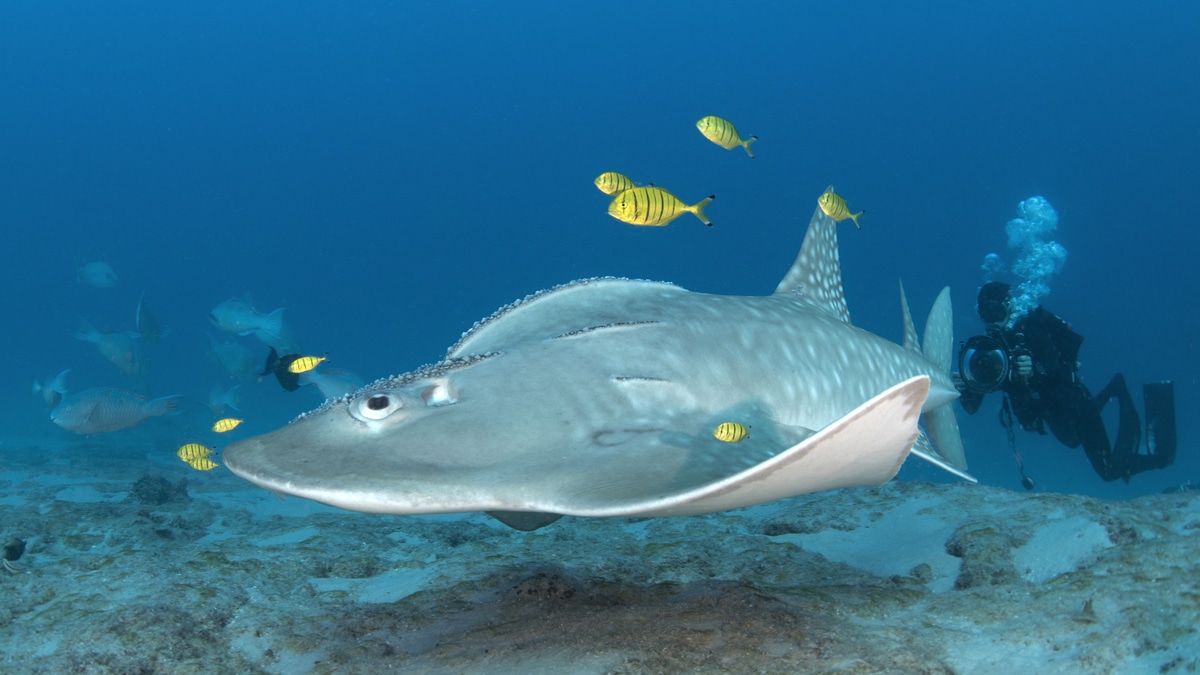
 Scientists from the Marine Megafauna Foundation (MMF) have placed acoustic and pop-up archival satellite tags on two species of wedgefish, the bottlenose wedgefish (Rhynchobatus australiae) and the bowmouth guitarfish (Rhina ancylostoma), kickstarting a first of its kind study for these species in Mozambique.
Scientists from the Marine Megafauna Foundation (MMF) have placed acoustic and pop-up archival satellite tags on two species of wedgefish, the bottlenose wedgefish (Rhynchobatus australiae) and the bowmouth guitarfish (Rhina ancylostoma), kickstarting a first of its kind study for these species in Mozambique.
Bottlenose wedgefish and bowmouth guitarfish are listed as Critically Endangered by the IUCN Red List of threatened species. Both are species of ray and members of the family Rhinidae, collectively known as wedgefish, a group recently identified as one of the world’s most endangered marine fish.
Wedgefish are characterized by a life history of slow growth, late maturity, and low reproductive rates, making them particularly susceptible to population decline from overexploitation. They are captured across the globe in commercial and artisanal fisheries using various types of fishing gear including nets, trawls, longlines, and handlines. They are either targeted or retained when caught as bycatch, as their fins are highly valued in the shark fin trade. Very little is known about the biology or ecology of these rays and consequently few management plans exist to protect declining populations worldwide.
The study is taking place in the protected waters of the Bazaruto Archipelago National Park and the Vilanculos Coastal Wildlife Sanctuary. MMF researchers are working alongside park authorities and managers to identify primary aggregation sites for these species, understand their movements and home range, and identify the threats they may face in the region.
The two types of tag provide different, yet complementary, information that can be used to investigate fine and broad-scale movements. “By using this particular combination of tags, we can learn where the animals spend most of their time, whether visits to specific sites are year-round or seasonal, how far they move, how deep they dive, and which temperatures they prefer,” explains Dr. Andrea Marshall, MMF co-founder and co-lead of the project. “This will help to identify areas of critical habitat that must be prioritized for protection.”
Acoustic tags are small transmitters that emit a unique acoustic signature, which is detected by an array of underwater acoustic receivers or ‘listening stations’ whenever a tagged animal comes within a few hundred meters. The Mozambican acoustic array spans from the Bazaruto Archipelago to Ponta do Ouro on Mozambique’s southern border and is managed collaboratively by MMF, Oceans Without Borders, and South Africa’s Oceanographic Research Institute. The receivers store the information from tags and researchers collect the receivers every few months to download the data and see which of the tagged animals have been detected. The batteries on acoustic tags last up to 5 years, providing valuable long-term insight into the movement patterns of tagged species.
Pop-up satellite archival tags (or PSAT/miniPAT tags) are attached to the dorsal fin of the wedgefish and record depth, temperature, and light-level data. Light-level data is used to determine the location of the animal through ‘light-based geolocation,’ where sunrise and sunset times are used to predict location. Data are collected and summarized in the internal memory of each tag, ready to be transmitted. These particular tags are programmed to stay attached to the wedgefish for 6 months, before detaching, floating to the surface, and transmitting a summary of the archived data back to scientists via the ARGOS satellite network. These tags also provide valuable information on vertical movements (diving behavior), depth, and temperature preferences.
With so little known about wedgefish and their relatives globally, researchers are intrigued to see what these tags will show. “We are very excited to see what the tags can tell us about these curious animals,” says Dr. Marshall. “With such little information available, we truly aren’t sure what to expect. Wedgefish could easily be compared to the pangolin of the ocean. They are rare, elusive, critically endangered, and fished intensively for their fins. Just like pangolins, they require urgent protection. No doubt the data from this study will give us a better understanding of how to better protect these species in Mozambican waters — a global stronghold for wedgefish.”
“We are proud to be able to participate in and benefit from this groundbreaking research,” says David Gilroy, General Manager of the Vilanculos Coastal Wildlife Sanctuary. “We rely heavily on the input of MMF scientists to inform the management of our protected area and the local environment at large, and we hope that the data shared with us in time will help us to better protect and safeguard these incredibly important species and their habitats.”
The MMF team in Vilanculos will continue to deploy additional tags in the coming months. The work is supported by the Blue Action Fund, the Mohamed bin Zayed Species Conservation Fund, Ocean Wildlife Project, and a number of private donors.
For more information about the work of MMF visit their website by clicking here.
Blogs
The Ocean Cleanup Breaks 10,000,000 KG Barrier

The Ocean Cleanup, the global non-profit project, has removed a verified all-time total of ten million kilograms (22 million lbs.) of trash from oceans and rivers around the world – approximately the same weight as the Eiffel Tower.
To complete its mission of ridding the oceans of plastic, The Ocean Cleanup uses a dual strategy: cleaning up the Great Pacific Garbage Patch (GPGP) to remove the plastic already afloat in the oceans, while stopping the flow of plastic from the world’s most polluting rivers.
Through cleaning operations in the GPGP and in rivers in eight countries, the cumulative total of trash removed has now surpassed ten million kilograms. This milestone demonstrates the acceleration of The Ocean Cleanup’s impact, while underlining the astonishing scale of the plastic pollution problem and the need for continued support and action.
While encouraging for the mission, this milestone is only a staging point: millions more tons of plastic still pollute our oceans and The Ocean Cleanup intends to continue learning, improving and innovating to solve this global catastrophe.
This announcement comes as governments from around the world meet to continue negotiations to develop a new legally binding instrument to end plastic pollution at INC4 in Ottawa, Canada. Representatives of The Ocean Cleanup will be in attendance and the organization will be urging decision-makers to collaborate towards a comprehensive and ambitious global treaty which addresses plastic at all stages of its life cycle and in all marine environments worldwide, including in areas beyond national jurisdiction.
It is encouraging to see that the need for remediation is reflected in the various options for potential treaty provisions. It is essential that the final treaty contains clear targets for the remediation of legacy plastic pollution, and reduction of riverine plastic emissions.
Tackling plastic pollution requires innovative and impactful solutions. The treaty should therefore incentivize the innovation ecosystem by fostering innovations that make maximal use of data, technology and scientific knowledge – such as those designed and deployed by The Ocean Cleanup.
‘After many tough years of trial and error, it’s amazing to see our work is starting to pay off – and I am proud of the team who has brought us to this point.’ said Boyan Slat, Founder and CEO of The Ocean Cleanup. ‘While we still have a long way to go, our recent successes fill us with renewed confidence that the oceans can be cleaned.’
The Ocean Cleanup was founded in 2013 and captured its first plastic in 2019, with the first confirmed catch in the GPGP coming soon after the deployment of Interceptor 001 in Jakarta, Indonesia. After surpassing one million kilograms of trash removed in early 2022, the non-profit project has since progressed to the third iteration of its GPGP cleaning solution, known as System 03, and a network of Interceptors currently covering rivers in eight countries, with more deployments set for 2024.
About The Ocean Cleanup
The Ocean Cleanup is an international non-profit organization that develops and scales technologies to rid the world’s oceans of plastic. They aim to achieve this goal through a dual strategy: stemming the inflow via rivers and cleaning up the legacy plastic that has already accumulated in the ocean. For the latter, The Ocean Cleanup develops large-scale systems to efficiently concentrate the plastic for periodic removal. This plastic is tracked and traced through DNV’s chain of custody model to certify claims of origin when recycling it into new products. To curb the tide via rivers, The Ocean Cleanup has developed Interceptor™ solutions to halt and extract riverine plastic before it reaches the ocean. Founded in 2013 by Boyan Slat, The Ocean Cleanup now employs a broadly multi-disciplined team of approximately 140. The foundation is headquartered in Rotterdam, the Netherlands.
For more information, visit: theoceancleanup.com and follow @theoceancleanup on social media.
Marine Life & Conservation
Steve Backshall to headline Shark Trust’s flagship event: For the Love of Sharks

Join a host of amazing, shark loving, speakers including Steve Backshall and the Shark Trust team for an evening celebrating shark conservation at the Royal Geographical Society in London this November.
Date: 29th November 2024
Time: 6-10pm
Location: Royal Geographical Society, London
Tickets: https://www.sharktrust.org/Event/flos24
The event will be a celebration of all things shark. Those lucky enough to get hold of tickets will hear from engaging guest speakers with a passion for sharks.
The line-up includes (*subject to change if unforeseen circumstances arise)
Steve Backshall: One of television’s busiest presenters, BAFTA award-winning wildlife expert Steve has been passionate about the wild world ever since he was young.
Steve’s impressive TV career has taken him all around the world, investigating a wide array of species and environments. Steve has filmed over 100 hours of children’s wildlife programmes with the BAFTA award winning Deadly 60 franchise and recently, with Sky Nature, for his new series ‘Whale with Steve Backshall’. He has been a patron for the Shark Trust for 10 years.
Simon Rogerson: is a photojournalist specialising in natural history, diving and the sea.
He is editor of SCUBA magazine, the official journal of the British Sub-Aqua Club. Simon started his career as a crime reporter but gravitated towards his ‘less depressing’ interest in underwater exploration, joining the staff of DIVE magazine in 1999. In 2005 he was named ‘Editor of the Year’ in the PPA’s Independent Publishing Awards. Simon also works as a freelance writer, contributing frequently to the Sunday Times and Telegraph, in addition to BBC Wildlife, Esquire, and a host of international diving magazines. He is the author of a book, Dive Red Sea, published by Ultimate Sports. Now based in Berkshire, Simon has been a Patron of the Shark Trust for 20 years.
More speakers to be announced soon. Head to the Shark Trust website to learn more.
The evening will also allow guests the final chance to see the Oceanic 31, shark art exhibition. Some of the artwork will be auctioned/raffled at the event, while the rest will be auctioned online to raise money for the Shark Trust Oceanic Programme.
For the Love of Sharks is an evening with something for everyone who is interested and fascinated by sharks. Join the Shark Trust, their Patrons, Trustees and Staff, along with a host of supporters for this celebration of shark conservation.
For more information or to buy a ticket: https://www.sharktrust.org/Event/flos24
-

 News3 months ago
News3 months agoCapturing Critters in Lembeh Underwater Photography Workshop 2024: Event Roundup
-

 Marine Life & Conservation Blogs3 months ago
Marine Life & Conservation Blogs3 months agoCreature Feature: Swell Sharks
-

 Blogs2 months ago
Blogs2 months agoMurex Resorts: Passport to Paradise!
-

 Gear Reviews3 weeks ago
Gear Reviews3 weeks agoGEAR REVIEW – Revolutionising Diving Comfort: The Sharkskin T2 Chillproof Suit
-

 Blogs2 months ago
Blogs2 months agoDiver Discovering Whale Skeletons Beneath Ice Judged World’s Best Underwater Photograph
-

 Gear Reviews3 months ago
Gear Reviews3 months agoGear Review: Oceanic+ Dive Housing for iPhone
-

 News2 months ago
News2 months agoPADI Teams Up with Wellness Brand Neuro to Drive Ocean Change and Create a Blue State of Mind
-

 Marine Life & Conservation2 months ago
Marine Life & Conservation2 months agoSave the Manatee Club launches brand new webcams at Silver Springs State Park, Florida


